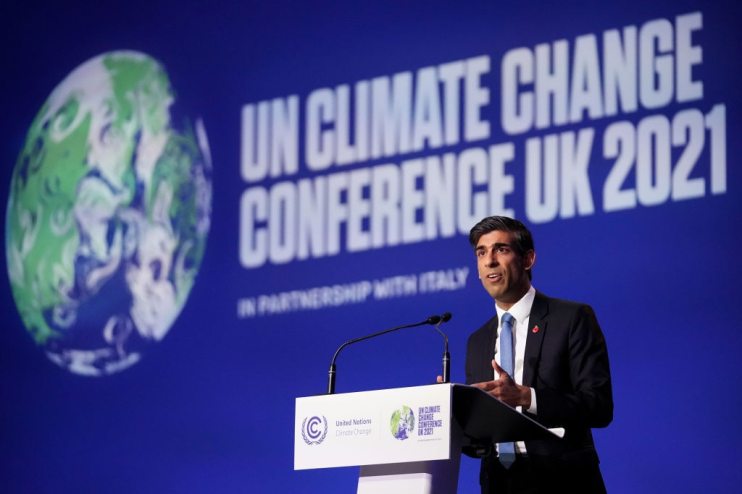Cop26: Sunak to force all UK financial firms to publish net-zero transition plans

The UK’s financial institutions and listed firms will soon have to publish strategies on how they will transition to net-zero by 2050 as Rishi Sunak today unveiled his plan to make Britain the world’s first “net-zero financial centre”.
The chancellor today said great efforts have been made to “rewire the entire global financial system for net zero”, but they now must go further.
The commitment has been delivered through the Glasgow Financial Alliance for Net Zero (GFANZ) and will see 50 firms based in 45 countries come under the new rules.
The change will mean financial assets worth around $130 trillion – 40 per cent of the globe’s financial assets – are aligned with the UK’s climate goals in the Paris Agreement, including limiting global warming to 1.5 degrees celsius.
A new body, called the Transition Plan Taskforce, will be created to stop UK financial institutions and public firms from greenwashing when they draw up their climate transition plans.
The Treasury said the transition plans should show “high-level targets the organisation is using to mitigate climate risk, including greenhouse gas reduction targets … interim milestones and … actionable steps the organisation plans to take to hit those targets”.
Speaking at the finance ministers meeting at the Cop26 climate summit in Glasgow today, Sunak said the UK has a “responsibility to lead the way” on decarbonising the City and will urge firms to “mobilise private finance quickly and at scale”.
“I know when people hear about global finance it can seem remote and abstract, but we’re not simply talking about numbers on a page,” he said.
“We’re talking about making a tangible difference to people’s lives. About cheap, reliable and clean electricity to power schools and hospitals in rural Africa. About better coastal protections in the Philippines and Pacific Islands to protect people from storm surges.”
It comes after Sunak last year announced a package of measures to “green” the City, including forcing listed companies, asset managers and pension schemes to disclose the environmental impact of their investments.
Andy Mayer, chief operating officer at the free market Institute of Economic Affairs think tank, said: “The simple truth of green finance is that if it’s good business investors will invest.
“It requires no government intervention whatsoever, let alone the unhealthy collusion of major corporations with state actors, which strongly risks over-regulation to exclude competition, and the mis-selling green moonshine as fine wine by under-pricing risky ventures as safe bets.”
Catherine McGuinness, policy and resources chair at the City of London Corporation, welcomed Sunak’s announcement.
“While many firms were already taking this step, the new rules will ensure that the UK sets the pace internationally,” she said.
“Critically, this move will support investors’ ability to drive change, and give them a clearer understanding of the impact of their equity investments.”
Hywel Ball, EY’s UK chair, said of the requirement announced today for UK listed business to publish their net zero transition plans: “The chancellor’s announcement is an extremely positive step in the fight against climate change. It’s been clear for some time that business need to move from purpose statements and pledges, to really focus on detailed transition plans and to start seeing hard evidence of action being taken.
“Making the requirement mandatory makes it slightly easier for companies to move at pace. If all those businesses in scope have to adhere to the same requirements, it keeps the playing field level for all.
He added: “While some businesses have moved quickly to lead in this space – seeing positive growth and value opportunities in leading the charge – there is no doubt that some have been waiting for others to make the first move. Mandatory reporting requirements removes this ‘I’ll go when you go’ scenario, which can only be a positive thing.
Luke Murphy, head of environmental justice at the progressive Institute for Public Policy Research think tank, said Sunak had not provided enough detail for his plans to judge whether they were credible.
“Worryingly, the chancellor’s plans also fail to require the setting of legal targets,” he said.
“We also need to see plans and targets extended beyond just emissions to include nature-based targets and for the creation of a public league table so the public can compare company performance.”
An agreement was also struck yesterday at Cop26 by 40 countries, representing the 70 per cent of the global economy, to encourage greater private sector investment into green technologies in a bid to make them cheaper.
The announcement included the launch of the Global Energy Alliance for People & Planet, which has $10bn (£7.34bn) of funding from philanthropies and development banks to “energy access and the clean energy transition in the Global South”.